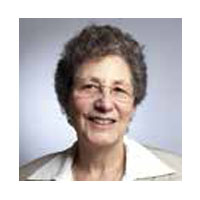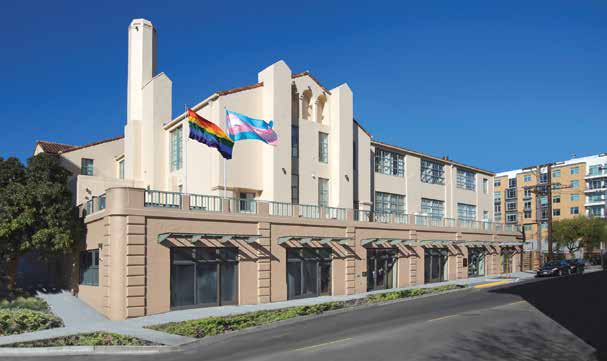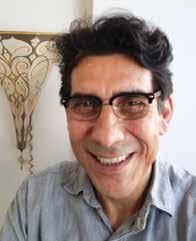 By Marcy Adelman
By Marcy Adelman
Today, March 23, we celebrate the grand opening of 55 Laguna, San Francisco’s first LGBT-welcoming affordable housing for seniors. The new apartments, developed in partnership with Openhouse and Mercy Housing California, are a critical component of a shared mission to meet the growing needs of San Francisco’s 25,000 LGBT seniors, many of whom struggle to find access to quality services and housing for fear of discrimination and compromised care.
As the co-founder of Openhouse with my late partner Jeanette Gurevitch, I could not be prouder than I am of serving alongside the hundreds of people who made this dream possible. Openhouse, the LGBT community and allies, political officials, LGBT elders and the City of San Francisco worked together to bring our founding vision of senior housing and communitywide services to life.

55 Laguna Resident Robin Rheult Has a New Home, and Hope
The Openhouse community at 55 Laguna provides ten studio apartments, twenty-six one-bedroom apartments and four two-bedroom apartments. One such residence is now the home of Robin Rheult, a 55-year-old transwoman. “This place is a gift,” Rheult recently said. “To be able to wake up and feel safe and know you have a community that supports you … as a post-op transwoman, to know I have a safe place to live that I can afford for the rest of my life … I am just so humble and grateful for this and to know people care about me. On my floor, there are gay men and four trans sisters. To walk out my apartment door and know I have likeminded people around me is a comfort.”
Rheult continued, “There was nothing for transgender people when I was growing up. I was tortured and beaten for being who I was. I didn’t even know what I was. I just wanted to be accepted, but there wasn’t any acceptance. Because of that I had a lot of mental health problems and substance abuse issues.”
“I came to San Francisco in 1993 from New York City because my sister lived here,” Rheult added. “She helped me get into rehab at Waldon House. They saved my life. They enabled me to stop running and to start my life over. I became a productive person. I became a hair dresser by trade.”
“I did the work to deal with alcohol,” Rheult said. “But I was just starting to do the deeper work about myself. I felt empty and unhappy. After more than a decade of sobriety I relapsed. Finally, I realized I had to deal with my authentic self and transition. I asked Waldon House to help me and they did. I got sober. For the first time, I started to accept myself. While I was in the program Waldon, I was offered an SRO unit through Shelter + Care, a mental health and substance abuse program in the Ambassador Hotel in the Tenderloin. I am grateful for that. I went through all my surgeries there.”
“Then one day I got a call from S+C with another offer,” Rheult continued, “this time for a studio apartment at 55 Laguna. It was a gift. When I lived at the Ambassador Hotel, life was very difficult. I didn’t feel safe. I had to defend myself and keep people at a distance. But here, in my new apartment, I recently went to a resident potluck and the room was filled with laughing smiling people—everyone is happy, happy just to be here, to be living here. Every time I come home and come through the front door I feel love and gratitude. I feel people care about me. It feels like a new beginning, a chance at a new life.”
Soon Will Be the Largest LGBT Affordable Senior Housing Project in the Nation
Although Rheult, myself and others will be celebrating 55 Laguna’s grand opening today, the housing project—located in Hayes Valley—opened its doors in January of this year. The renovated historic building not only offers forty senior apartments, but it is also home to the Bob Ross LGBT Senior Center. The building, combined with a new and much larger building at 95 Laguna slated to break ground this fall, will provide a total of 119 affordable senior apartments and a community center with almost 8000 square feet of activity space. Together, this hub of LGBT-welcoming housing and services will be the largest LGBT affordable senior housing project in the nation.
The $56 million-dollar development was financed primarily with low income housing tax credits and with monies from the Mayor’s Office of Housing and Community Development. According to City regulations, occupancy was subject to a lottery. The residents are a diverse group, and while not exclusively LGBT, are primarily LGBT. Sixty-seven percent of the residents are LGBT identified, six percent are transgender and fifty-seven percent are people of color.
The building itself is an architectural gem with historic California murals, 20-foot ceilings and graceful arches. The building was the first teachers’ college in San Francisco.
 Caring, Knowledgeable Staff
Caring, Knowledgeable Staff
Openhouse’s new Executive Director, Karyn Skultety, has dedicated her career to serving seniors. She is drawn to advocate for what people need and want in their lives, while helping them to recognize their own strengths. She described the services provided to Openhouse community residents as follows:
“An Openhouse staff member serves as the Resident Services Coordinator for 55 Laguna. This position is funded through our excellent partnership with Mercy Housing. The Resident Services Coordinator provides a multitude of on-site, community-based and integrated services including on-site case management, crisis intervention services and coordination and linkages to services. She also works with residents on community building activities on site. In addition, the Services Coordinator works closely with the rest of the Openhouse team to ensure residents participate with the wide array of emotional support, health and wellness, and educational offerings Openhouse offers to the broader community. These services are generously supported through contracts with the Department of Adult and Aging Services and a number of foundation and corporate grants.”
Skultety explained why it is important to build LGBT-welcoming housing at this time.
“While it is true that there has been amazing progress in the LGBT movement in the past ten years, we can all agree that the fight for justice for LGBT people is far from over,” she said. “It is important for people to understand that experiences of discrimination, violence and victimization stay with us forever, not just when a particular event ends. We know that every LGBT senior has had to fight discrimination throughout their lives, and unfortunately that fight is far from over.”
“The LGBT Aging Task Force report tells us that nearly fifty percent of LGBT seniors have faced discrimination in the past year right here in San Francisco,” Skultety explained. “Almost ninety percent report feeling that staff in care facilities would discriminate against an LGBT elder if they were out. This tells us that people do not feel safe, that discrimination is real and does not go away even when we are able to expand our legal rights. LGBT-welcoming senior housing becomes more than just safe housing. It becomes a symbol for what every program should provide, whether in healthcare settings, assisted living facilities, board and care home, or any other housing and service provider.”

She sees even more housing in Openhouse’s future. As Skultety said, “We will always pursue opportunities that fulfill our mission to create a home for every LGBT senior in San Francisco and beyond. With an amazing partner, like we have had with Mercy Housing for this project, we would certainly want to be a part of new housing that welcomes LGBT seniors to the home they deserve. I also think it is important to say that no matter how much housing we build, there won’t be enough—especially in the Bay Area. So, it’s important that we work equally hard on improving the experience people are having in the homes they are in, whether that is an apartment, assisted living facility, nursing home or an SRO.”
“Are we really making sure LGBT elders feel safe, feel welcome, and feel like people see them and treat them for who they really are?” she asked. “Are providers really providing services that are culturally sensitive and support a home? Are we creating a community people feel a part of? At the end of the day, housing can feel like just housing. It takes all of us invested in our communities and working with respect for our elders to making housing feel like home.”
Resident Ron Cordova Appreciates Supportive, Nurturing Community
Ron Cordova, a 68-year-old gay man and resident at 55 Laguna, now has just that—a comforting home.
“I wouldn’t have applied to live here if Openhouse hadn’t made the application process accessible,” Cordova said. “It seemed like a big bureaucratic mess. They simplified it and encouraged me to be hopeful about remedying my housing situation. They really got me out of a terrible situation.”
He explained: “I was living in an SRO in the Tenderloin with 120 units. Here, there are only 40 units. The bathroom in my apartment is the size of the unit I was living in at the SRO. I am still adjusting. Even my cat Carlos was cowering in the bathroom. For a while, the new apartment was just too much space!”
“There were a lot of drugs where I lived before,” he continued. “It wasn’t easy living there, but it gave me my health back. Having a roof over your head is very important, especially when you are sick. I am grateful to have had that place where I could take care of myself.”
“Moving here was like a miracle,” he added. “It was unbelievable. The building itself has so much character. I feel very lucky to be here. I’m in a studio with large windows and high ceilings. I live on the top floor. I don’t have a view, but I can see the sky and the courtyard below. You can walk out and be in a neighborhood.”
“But 55 Laguna is a place to spread yourself out,” Cordova said. “It is quiet. After eight years of a hotplate, here I have a stove and a refrigerator. All these amenities have an impact on life. I even have places to hang the light fixtures I used to make and sell. I make them out of brass armatures stretched with Chinese silk and painted with metallic pigment. I am thinking of starting to make them again.”
“Just to be able to stay in San Francisco is great regardless of how much it changes,” he said. “It’s the people. There is a community here that is constant. I am an HIV survivor. I go to the AIDS Health Project. They have all sorts of helpful services. We should be retiring with our peers, but they are gone. A lot of people’s lives were stunted and unable to continue. It was devastating. The underlying grieving goes on all the time.”
“A couple of weeks ago,” Cordova added, “the Church Street Station was torn down. Oh my god, it felt like we had never been here. But 55 Laguna says we are still here. A couple of weeks ago, a music group showed up to play in the community room. Four men had heard about 55 Laguna, and volunteered to play for us. The music was a combination of original folk and jazz pieces. It was very emotional and moving for me to walk into this room with live music. I thought: we are not forgotten.”
Marcy Adelman, Ph.D., a clinical psychologist in private practice, is co-founder of the non-profit organization Openhouse. She is also a leading advocate and educator in LGBT affirming dementia care and a member of the Advisory Council to the Aging and Adult Services Commission.
Recent Comments